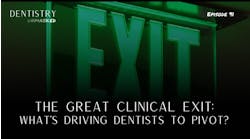As many dental practices today are expanding into multi-location enterprises, mobility to and from different locations on the part of some employees is becoming a job expectation. As such, now more than ever, employees are finding themselves driving for work-related reasons. While this may enhance productivity and facilitate business operations, it also raises legitimate concerns for employers.
Whether employees are driving to meetings at other practices, delivering supplies, running errands, or engaging in supervisory/managerial functions, the use of private vehicles for work-related purposes is becoming more commonplace. With this comes a host of legal considerations for employers, particularly concerning liability in the unfortunate event of a car accident involving their employees. Understanding these legal responsibilities is crucial for protecting your business.
More by Rebecca Boartfield and Tim Twigg:
Noncompete agreements: A relic of the past?
Have "stay conversations" to increase retention
To start, employers need to understand that they have a fundamental duty to ensure the safety and well-being of their employees, even when they’re on the road. Negligence on the part of the employer can lead to legal repercussions if an employee is involved in a car accident while on duty, so employers need to be vigilant in their approach.
Vicarious liability
A key legal concept in employer liability for work-related car accidents is vicarious liability. This doctrine holds employers responsible for the actions of their employees while performing job-related tasks. If an employee is at fault for an accident during work hours, the employer can be held liable, even if the employer had no direct involvement in the incident. This places a considerable burden on employers to ensure that employees are adequately trained, licensed, and fit to drive.
Workers’ compensation liability
If an employee has a driving accident while carrying out work-related duties, they will likely be covered by workers’ compensation insurance. This coverage typically provides complete compensation for medical bills and may provide up to two-thirds of an employee’s lost wages if they’re unable to work while recovering. As a result, this could negatively impact claim history and increase premiums, not to mention increase employee protections from adverse action.
Protecting your practice
If you have employees driving for work-related purposes, consider the following:
- Establish clear policies: Expectations regarding such items as use of mobile devices while driving, keeping insurance up to date, and obeying traffic laws need to be clearly communicated. Employees need to be aware of the practice’s expectations and the consequences of violating these policies.
- Screen employees: Before allowing employees to drive for work, employers should run a check on their driving record. For ongoing activities, this may need to be done annually. An employee with a history of reckless driving or multiple traffic violations may pose a higher risk on the road and increase liability for the employer.
- Confirm active driver’s license: Ensure you have a copy of the employee’s driver’s license on file and keep it updated as necessary.
- Confirm auto insurance coverage: Keep records on file of the employee’s up-to-date auto insurance, and confirm their coverage is adequate (minimum $500,000 is recommended). For ongoing activities, this may need to be done annually. Likewise, employers must ensure their insurance covers them for “nonowned autos.” “Nonowned auto” coverage provides extra coverage over the employee’s personal auto coverage for bodily injury and property damage liability. Employers may also need a “hired autos” policy as well.
- Train employees: Regularly educate/train employees on your policies and promote responsible driving behavior.
Rules around compensation
Employees driving for work are performing a work duty, so their time must be paid. This includes driving between worksites, running errands, or any other time they’re acting on behalf of the employer. A failure to compensate employees for this time will not avoid the potential for liability. In fact, it may only make it worse because of the added possibility of a wage and hour claim.
Businesses should also have employees track their driving miles and issue an expense reimbursement using the IRS-approved per mile rate for the cost of gas and wear and tear on the vehicle.
Don’t jeopardize your business—do your homework
While work-related driving can significantly enhance productivity and business operations, it comes with inherent risks and responsibilities. Understanding and proactively addressing these responsibilities through proper training, comprehensive insurance coverage, and clear policies not only protect you but also contribute to a safer work environment. Safe travels and minimizing risks start with proper preparation and careful management, and employers who ignore these facts are jeopardizing their business.
Editor's note: This article appeared in the January 2024 print edition of Dental Economics magazine. Dentists in North America are eligible for a complimentary print subscription. Sign up here.
Rebecca Boartfield is HR compliance consultant and Tim Twigg is president of Bent Ericksen & Associates. For more than 30 years, the company has been a leading authority in human resources and personnel issues, helping dentists successfully deal with ever-changing and complex labor laws. To receive a complimentary copy of the company’s quarterly newsletter or to learn more, call (800) 679-2760 or visit bentericksen.com.







